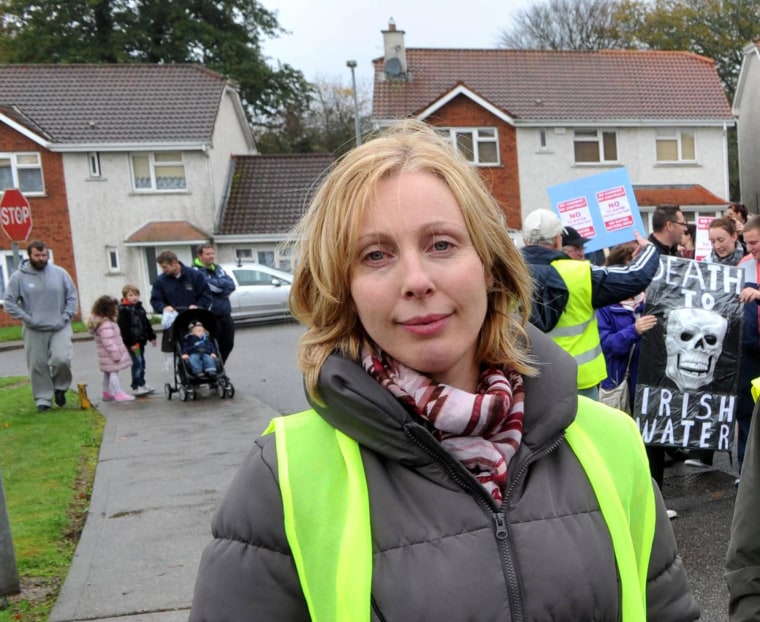In her 43 years, mother-of-three Karen Doyle had never gotten so much as a parking ticket. But a couple of weeks ago, she found herself being hauled off by police in the Irish seaport of Cobh, which has become a flashpoint in the battle between the government and the populace over the most basic of elements: water.
A crew from the newly created national authority in charge of supplying water for a fee had arrived on Cobh, best known as the Titanic's final port of call, to install meters. Doyle and other residents were ready, thanks to a surveillance system they launched weeks before.
So-called "spotter cars" kept an eye out for Irish Water trucks trundling onto the picturesque community of 11,000, while a fleet of "floater cars" tailed the trucks to see which neighborhoods they planned to visit. A flurry of Facebook messages to team leaders brought reinforcements to the targeted areas.
That's how Doyle found herself standing over a stopcock valve on a neighbor's property as Irish Water employees put up orange barricades. After a standoff, police were summoned and Doyle had to quickly decide how far she would take her civil disobedience.
"I saw another woman holding the hands of two children at another home," she said. "Our eyes locked for a few minutes and I thought, 'This government has mothers standing out here to be arrested.' And I said to myself, 'I'm here for our children and to make this stand.'"

Silence fell over the crowd as she and two others were taken away by the Gardai to be booked for obstruction, she said. But the arrest didn't dampen her activism. As Doyle spoke to NBC News earlier this week, she was standing in front of another subdivision to make sure Irish Water wouldn't get in without a fight.
"It's given us a sense of empowerment," she said.
It's no small irony that water has become the central controversy in Ireland, a country of 4.5 million surrounded by an ocean that stays a lush green thanks to 150-plus rainy days per year.
After six years of austerity measures and tax increases prompted by the collapse of the once-thriving Celtic Tiger economy and a European bailout, water charges that took effect Oct. 1 were "the straw that broke the camel's back," said Brendan Ogle of the Right2Water campaign.
A coalition of trade unions, community organizations and leftists organized protests that flooded the streets with tens of thousands of people. A Dec. 10 rally to celebrate H20 as a human right will include a delegation from bankrupt Detroit, where thousands of people had their water shut off earlier this year.
The campaigners' position is that the Irish citizenry already pays for water, through income taxes, so they're being socked twice by the fees, which are based on usage and range from 175 euros ($218) to 585 euros ($729) a year. Authorities say it works out to an average cost of $350 per household annually.
Some conservationists and economists say usage-based fees are good for the environment and the economy and standard in other European countries and America. The protesters argue the scheme unfairly burdens poor and working-class families and is part of a conspiracy to eventually privatize the water system.
The deluge of outrage has Ireland's coalition government in an uproar, with politicians rushing to mollify the public.
It was only in May that then-Environment Minister Phil Hogan sternly warned that “for people who don’t pay, their water pressure will be turned down to a trickle."
Now proposals for tax relief that would vastly lower the costs are being floated, with details to be unveiled in the coming days. There's even talk of a referendum to to add a guarantee of public water to the constitution.
"How can one baby have the right to have a bath and another can't by virtue of the money that's in their pockets?"
The current environment minister, Alan Kelly, has admitted "mistakes were made" in pushing through the plan, but said last week that the creation of the utility is essential to protecting the country's water system, which has a leakage rate of about 41 percent.
"Put simply if we do not have Irish Water, we do not have the capacity to borrow the money to invest in much-needed infrastructure to provide a water supply for future generations for domestic use, for future industrial development and many other reasons," he said, according to the Irish Times.
Noreen Murphy, 49, an out-of-work Montessori teacher with a semi-retired husband who lives in a suburb of Cork, isn't appeased by any of the concessions made so far. She predicted the allowances will disappear down the road, leaving cash-strapped families to think twice when opening the spigot.
"How can one baby have the right to have a bath and another can't by virtue of the money that's in their pockets?" she said. Murphy vowed not to register with Irish Water or accept a meter, saying she simply can't afford to pay for water.
"Every penny is accounted for in this house," she said. "It would mean we would have to sit in the cold and decide whether we could have a pot of tea."
With a rueful laugh, she wondered how it had come to this.
"We are such a wet country. You need wellington boots and an umbrella," Murphy said. "It just rains and rains and rains."